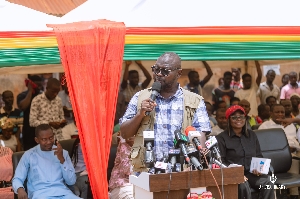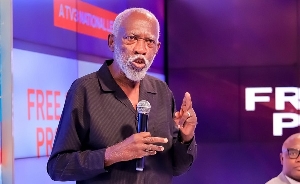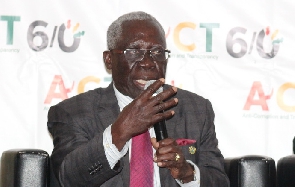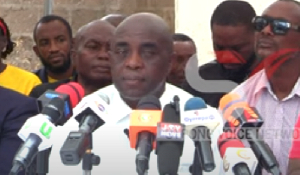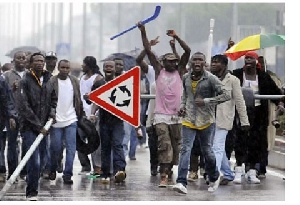 There have been several reports of acts of violence by vigilante groups in the country
There have been several reports of acts of violence by vigilante groups in the country
Hardly a day passes these days without reports in the news media about attacks, threats of attacks and general insecurity perpetrated by groups of young men said to be affiliated to the ruling NPP.
Last week alone there were reports of attacks in Karaga in the Northern Region, Sissalla West in the Upper West Region, Adeiso in the Eastern Region and Techiman in the Brong Ahafo Region. It is said that, since the NPP assumed the reins of power, there have been over twenty recorded cases of indiscipline by groups said to be affiliated with it.
Members of the current opposition, especially the largest opposition party have not spared any moment in lambasting the government for what is happening. Appointees of the government and its sympathizers, on the other hand, hold the view that similar incidences were recorded when the NDC was in power and that it is the failure of the then government to act that has emboldened the current groups to misbehave.
The aim of this write-up is to analyze what is happening in contemporary times with a view to predicting what the future holds for our beloved country. In doing so, I shall endeavour to recount the similarities and differences of what is happening today and what happened in the past. In order not to be tempted into what is generally described as equalization, it is my aim to attempt to proffer suggestions on how the country can end these unfortunate state of affairs.
It is general knowledge that the problem of vigilantism did not assume such astronomical proportions until 2001, when there was a change of government from the NDC to the NPP.
During the 11 years of military rule under the PNDC and the subsequent 8 years under the NDC, vigilantism was well managed because it was basically one party controlling all the resources of the nation. However, when the NPP took over power in 2001, its members, especially the young ones, saw that as an opportunity to also control the resources for once.
Most of these youth were unskilled people, some with limited education, who had watched with envy as members of the previous regime made their living from the toilets, toll booths, and lorry stations.
They, therefore, saw the change of government as an opportunity for them to also land jobs. Incidentally, at the time, heads of some public institutions were relieved of their positions, while some ministers and other appointees of the previous regime, who were found to have engaged in corrupt activities were brought to book. In the process, the NDC foot soldiers who saw facilities like toilets, lorry stations and toll booths as their offices lost out. They, therefore, bided their time until the next change of government to retaliate.
In January 2009, there was another change of government, Professor Atta Mills having won the 2008 Elections. As was to be expected, the country witnessed another display of machoism, vigilantism, and vandalism. The country actually got a taste of what was going to happen, when soon after the voting, foot soldiers and other members of the NDC laid siege at the Electoral Commission Headquarters demanding the announcement of the results or else they would make the country ungovernable. As soon as Professor Mills was sworn into office on 7 January 2009, the mayhem began. People like Kofi Portuphy and Amegashie, who lost their jobs when NPP came to power, simply went back for their jobs.
Then the foot soldiers or revolutionaries or however they called themselves, followed suit by seizing all the facilities being operated by the past regime, including toilets, lorry stations, bridges etc. Unfortunately, they did not limit their activities to snatching of the facilities. Some of them, also claiming to be NDC youth, launched attacks on their perceived enemies killing some of them. For instance, at Agbogbloshie, some youth believed to belong to the one of the faction in the northern conflict and its supporters chased youth belonging to the faction and butchered three of them to death just in front of a Police Station, where they running for refuge.
Other youth from the defeated faction had to seek refuge at the NPP Head Office and later fled up north thereby leaving their living huts and other income-generating activities behind.
What has been happening since the NPP came to power has however gone beyond what was witnessed in 2009. Indeed, the election results were announced, young men claiming to be NPP members laid siege over the whole country. What was most surprising was that these young were not just taking over toilets, lorry stations and toll booths, they were destroying them if they could not have them. Two young men were killed during that period, but there was nothing to suggest that they were targeted because they were NDC. I believe they were just victims of an over-zealous mob, who got carried away by their newly acquired power, whether real or imagined.
If you ask me, these young men are criminals taking advantage of the system by associating themselves with the political parties. The most active vigilante group in the NDC was the Azorka Boys, named after Sofo Azorka, who rose to become the Northern Regional Chairman of the NDC, having previously served as Vice Chairman. To the best of my knowledge, the Azorka Boys was not a toilet-grabbing organization.
They were most active during by-elections, during the NDC era, terrorizing members of the opposition, especially the NPP. Though they were based in Tamale, they were transported to any constituency where there was a by-election, to intimidate the opposition and soften the ground for their party candidate. I recall the Talensi by-election, when they descended on Tongo and unleased terror on the people.
What made them so successful was that they carried arms, which the security services turned a blind eye to. During the Talensi by-election, the police mounted a check-point and searched all vehicles to retrieve weapons. That was how they discovered the weapon in the vehicle of the National Chairman of the NDC. No other weapons were retrieved, which presupposed that no one else carried weapons into the constituency. Yet when violence broke out, the Azorka Boys fired guns to subdue their perceived enemies.
When the counting of votes was going on, Sofo Azorka allegedly walked up to Freddie Blay of the NPP, and gave him five minutes to leave the place. When Blay insisted that he was there to represent his party, Azorka gave him a slap, which was the signal for his Boys to attack. They then unleashed terror on the people, with the security services watching on helplessly. The NDC candidate would have won the by-election, even without this intimidation, because he was the most popular candidate, he had the support of the sitting government and he had more resources to prosecute his campaign.
The PNC candidate, who placed second, was even a more formidable candidate than the NPP candidate, even though an NPP MP had just then vacated the seat.
I had not heard of Delta Forces until after the 2016 elections; perhaps somebody will disprove me by quoting a newspaper article or a radio or TV programme where Delta Force was mentioned prior to the 2016 elections. The vigilante group then commonly associated with the NPP was the Invincible Forces. Some people called them INVISIBLE FORCES. Even then, the party itself denied their existence.
I recall when there was an attack on the NPP head office prior to the elections, the men who were found in the premises identified themselves as watchmen. The press, especially those sympathetic to the NDC identified them as Invincible Force. I wouldn't want to go into what actually happened at the time, especially the allegation that state security actually ransacked the premises and then facilitated their take-over by the group of disgruntled NPP members whose case in court might never see the light of day. This is the major difference between what NDC did in the past and what NPP is doing today.
This vigilante group, going by the names Delta Forces, has succeeded in creating branches all over the country to extort, threaten and seize facilities and demand for rights they are not entitled to. I believe they are virtually the same people who were active during the NPP days who have now metamorphosed into these groupings to satisfy their parochial interests. Did anyone hear the Delta Forces in Kumasi confess that they left the NDC for NPP because they were dissatisfied with what was happening? Ask them when they left the NDC.
The fact is that these vigilante groups have no nominal rolls, they have no ID cards, they simply belong. So they can change allegiance as and when it suits them. They have no permanent membership. If NDC wins the next elections, don't be surprised to see most of these boys spearheading their vigilante activities.
I actually have no problem with these vigilante groups. My problem is with the government of the day, because it bears ultimate responsibility for the security of the nation. If the security services are failing to act, they must be brought to order. I don't buy the excuse that the police are unwilling to act because they would be targeted by the political players. If you are doing the right thing, your conscience should be clear.
People are quick to point to the case of the police man, Nanka Bruce at the Flag Staff House. The story, as I heard it, was that Nanka Bruce allegedly assaulted a certain NPP youth who was seen jogging in the Flag Staff general area sometime before the elections. That man must have been looking for an opportunity to /retaliate, which presented itself with the change of government. I am not holding brief for him, but was Nanka Bruce acting legitimately when he allegedly assaulted the youth?
I have told a story to friends about how a soldier treated me harshly in 1979 at the Castle when I went to visit my big sister working there. I mistakenly used the wrong route to enter the Castle and this chap told me that if I didn't go back I would be sorry. I asked what I had done wrong and he used words such as idiot, stupid and foolish man on me. I had just completed secondary form five and I was qualified to join the army. At the time, they advertized for recruitment into the Ghana Army, so I immediately applied to join, so that I would deal with this man, whether by blows or by arms. Unfortunately, I failed during the long recruitment processes.
Now I don't even know if I would have remembered him if I had actually succeeded in joining the army then. Anyway, ten years later, after my tertiary education, I joined the Ghana Army as an Officer. It never occurred to me after that to trace this soldier. I have since become a Christian and I believe in turning the other cheek when slapped.
Even then, not everyone thinks that way. When we went to Liberia in 1993, a mate of mine decided to discipline a Non-Commissioned Officer, who was a drill instructor when we were Officer Cadets at the Ghana Military Academy. I had to convince him that the soldier was only doing his work, which had shaped him into the officer that he had become. So using the Nanka Bruce episode to characterize the entire NPP government or the president for allowing vigilantes to assault security persons will be misplaced.
I am surprised that the opposition is trying to directly link the president to the activities of these groups.
Some of them claim that President Nana Addo's "all die be die" mantra in 2012 has given the impetus for the excesses of the vigilante groups.
I don't personally see the "all die be die" saying as anything strange, but that is our way of playing politics in Ghana. In 1994, the Alliance for Change staged the "Kume me preko" demonstrations. I am not an Akan, but my simple understanding of "kume me preko" is kill me altogether. What is the difference between that and "all die be die"?
I am an avid sports fan and I know that the slogan of Kumasi Asante Kotoko is "Wo kum apem a, apem beba" loosely translated as "if you kill a thousand, a thousand will emerge". To me, it has the same basis as "all die be die" because it connotes persistence. It means that, if you believe in a cause, you are ready to die for it. Come to think of it, the Hearts of Oak slogan, "Never say die, until the bones are rotten" is in the same vain. It means, if you kill me and bury me, until my bones are rotten, I will not give up. Those who therefore see President Nana Addo's "all die be die" mantra as an opportunity to destroy his political fortunes are fighting a lost cause. It is no wonder that, even though it has been used against him since 2012, he still became president, with a massive endorsement in the 2016 electtions. They should have known by now that, such pettiness will not work against him.
The same cannot be said of Mr George Ayisi-Boateng, Ghana's High Commissioner to South Africa. He is reported to have told TESCOM members, during a meeting, that his priority, is to provide the needs of NPP members before considering other Ghanaians. The issue has already been flogged mercilessly, so I will be a bit charitable with my comments. I view this as the most unfortunate pronouncement made by a politician and a diplomat for that matter. Does he mean that, in the event of a crisis, he will first single out NPP members for protection, before attending to others? I can't believe I heard him right. One would have expected to hear this coming from a young politician and for Mr Ayisi-Boateng to counsel him. That, at his age, he could make such a pronouncement, has reduced his esteem in the eyes of many Ghanaians. He's among the type persons who are so selfish that they don't think beyond themselves, their ethnic group, their hometown, their family or their party for that matter.
I know he did not expect to be recorded so he spoke with reckless abandon. He must have been taken aback to hear his voice on air saying things he thought only a few young undergrads were privy to. One would have expected him to explain that it was political talk and he was only trying to impress his party members and to offer an apology. However, he showed no remorse. In fact, he said he did no wrong because he will always consider his wife and children before others. But do we need people like that to hold public office? Certainly not.
I would not begrudge him, if he was running his own business and decided to employ people on the basis of their political party affiliation, their tribe, their sex or religion. However, for somebody occupying public office and being paid by the collective taxes of all Ghanaians, he lacks the temperament to hold that office. If I were him, I would have jumped before I am pushed. I know we don't have the culture of resignation in Ghana, so we should not expect him to do so. That is why I urge the president to relieve him of his appointment immediately, to save his reputation and the name of the party he heads. I am aware of the infantile defence he tried to put up, that he has assisted NDC members such as ET Mensah in the past. Was that in an official capacity? Even so, as a public officer, he is not expected to pick and choose in the treatment of Ghanaians.
I think the problem of Ghanaians is that they are beginning to think of themselves as political party members first and Ghanaians second, when the other way round should be the case. We are all Ghanaians first and any other thing second. Some of us do not even belong to any party, but we are Ghanaians. And we may even be more qualified than those who belong to parties. Does it mean that we should be overlooked when employment opportunities are available? Elections are only processes to enable us select our leaders.
The moment elections are over and leaders selected, they become leaders of the entire country for the next four years. The President becomes the president of all Ghanaians, not a president of only his party. Those he appoints also become appointees of the country, not their parties. That is why Mr Ayisi-Boateng should have known better that he is a representative of all Ghanaians in South Africa and not the NPP. I worked with General JH Smith in Kumasi for over two years (between 1994 and 1996) and during that period, he never said one word to show that he was NDC. Several years later, when he appeared before Parliament's vetting committee to become Minister for Defence, he was asked if he was a card-bearing member of the NDC and his answer surprised many.
He said he was a member but not a card-bearing member. That is as it should be, in my view. I was even surprised at the question because I wondered if he would not have qualified for the job, if he was not a member at all.
I will end this article by restating that the young men patrolling the streets and creating mayhem are not necessarily fanatics of the NPP. They are young men hunting for jobs or means of livelihood. If they had jobs, they would not go around using the guise of playing politics to engage in criminal activities. Unfortunately, they are being used by the very same NPP members who failed to get certain jobs, as proxies to achieve their aim. Others may even be on the payroll of opposition elements to make the government unpopular.
To solve the problem of vigilantism or vandalism, the government should provide jobs for the unemployed youth. After all, it was the promise the NPP rode on to win the 2016 elections. Of course, it is impossible to create jobs for all the teeming youth in the country within one or two years. However, we need to see the signs that the jobs are coming. In the meantime, the security services should be up and doing in stopping or at least minimizing the destructive activities of these youth. The police should be seen to be working because that is why they have been employed. I have heard the President say, time and again, that the police should carry out their tasks without fear or favour.
The Minister for the Interior has also not spared any moment in urging the police to do what is expected of them. Those at the trouble spots appear not to be doing so because the violence is not abating anytime soon. The IGP is the chief constable of the Ghana Police Service and Ghanaians are yet to see him take pragmatic steps to stem the tide. The President cannot continue to appeal to him in vain. If he is not living up to expectation, Mr. President, fire him and appoint another one. That is what is done in the advanced countries.

